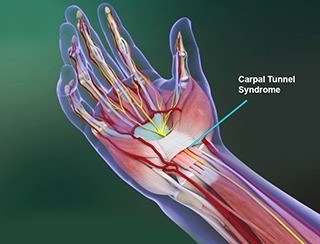Carpal tunnel syndrome

Carpal tunnel syndrome belongs to a group of conditions called peripheral compressive neuropathy. It is caused by compression of the median nerve at the level of the wrist. It is a common condition and affects adults, young and old, and can affect the dominant or non-dominant hand. Urban legend blames keyboarding as the cause of the condition, but it has been shown that keyboarding does not actively cause carpal tunnel syndrome. The fact that we rely so heavily on keyboarding on a daily basis may simply make the symptoms more noticeable. Patients who do not use a keyboard at all can also develop the condition.
Early symptoms include numbness and tingling in the thumb, index finger, middle finger, and half of the ring finger. Often the symptoms come on at night, when normal body fluids equalize between the upper and lower body, and this can cause numbness that awakens you from sleep, causing you to have to shake your hand out to restore sensation to the hand. Later symptoms include weakness, loss of coordination, and loss of muscle bulk at the base of the thumb. Pain is generally not a symptom of carpal tunnel syndrome.
The goal of treatment for carpal tunnel syndrome is to prevent the development of these later symptoms, which, when they occur, could signal permanent nerve damage. Treatments range from splinting to cortisone injections to surgery to remove the compression from the median nerve. Sometimes a nerve conduction study is performed to assess the extent of the nerve damage, and to help predict the expected outcome from any proposed surgery. Dr. Yu will discuss with you in detail the options, and her recommendations to achieve the best outcome for your hand.
Read more:




